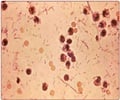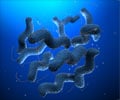Clinical Manifestations of Dengue and Dengue Hemorrhagic Fever
Dengue Classic dengue fever is characterized by: High persistent fever which usually fails to touch the baseline normal temperature (370 Celsus).
- Headaches
- Pain felt behind the eye-ball or Retro-orbital pain
- Mascular pain or Myalgia
- Pain in joints or Arthralgias
- Nausea and Vomiting
- White/red rashes or Maculopapular rash on the body
- Change in taste sensation
- Symptoms are milder in children than in adults
The illness is clinically indistinguishable from conditions such as Influenza, Measles or Rubella. The acute phase of illness lasts for up to 1 week followed by a 1 to 2 week period of convalescence when a patient feels weak, has feeling of being unwell and has loss of appetite.
Dengue
Initial stages of disease resembles symptoms of dengue fever.
Fever subsidies in 2 to 7 days followed by signs and symptoms of restlessness along with features of shock.
Hemorrhagic manifestations are prominent in the disease and include anyone or more of the following:
- Skin hemorrhages when there maybe small blotches of redness or more diffuse red or mottled red patches.
- Bleeding from nose or Epistaxis
- Bleeding from gums
- Blood in vomits
- Diminished platelets count also medically known as 'Thrombocytopenia'
These symptoms when not treated may lead to Dengue
Clinical Diagnosis of Dengue Hemorrhagic Fever: A simple test for Diagnosis of Dengue Hemorrhagic Fever is done by tying a tourniquet to the arm and looking for any red patches appearing in the forearm or arm. This test is called tourniquet test. Other manifestations of bleeding: from mucosal surface of mouth or injection sites or blood in vomits, black stools may indicate this fever. Other Signs of plasma leakage are accumulation of fluid in the chest or abdomen called pleural effusion or ascites.
Diagnosis of Dengue shock syndrome: In Dengue Hemmorhagic Fever besides the above tests one may find evidence of sudden and rapid development of shock manifested by rapid and weak pulse, and narrow pulse pressures (less than 20).
















